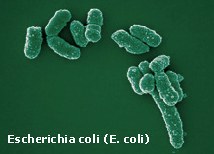Coliforms
Total Coliforms
Coliforms are a group of closely related bacteria that are generally free-living in the environment, but are also present in water contaminated with human and animal feces. They generally do not cause human disease (with some exceptions). However, their presence in water indicates possible contamination with human or animal wastes. Pathogenic bacteria in these wastes can cause short-term health effects. The total coliform group includes fecal coliform and E. coli.
Coliforms are used as an indicator of fecal contamination, as well as to determine the efficiency of treatment and the integrity of the water distribution system. The presence of total coliforms in drinking water indicates that the system may either be fecally contaminated or vulnerable to fecal contamination.
Health Implications
Coliform bacteria are not generally harmful. However, the total coliform test can indicate the presence of other pathogenic bacteria, such as E. coli, that can cause short-term health effects and disease.

Fecal Coliforms
Fecal coliforms are a group of bacteria that are associated with human or animal wastes. Also known as thermotolerant coliforms, these bacteria usually live in human or animal intestinal tracts, and their presence in drinking water is a strong indication of recent sewage or animal waste contamination.
During rainfalls, snowmelts, or other types of precipitation, fecal coliforms may be washed into creeks, rivers, streams, lakes, or groundwater. When these waters are used as sources of drinking water, and the water is not treated or is inadequately treated, fecal coliforms may contaminate drinking water. E. coli is a fecal coliform bacteria.
Fecal coliforms other than E. coli may also originate from organically enriched water such as industrial effluents or from decaying plant materials and soils. For this reason, the WHO states that, "the often-used term 'faecal' coliforms is not correct, and its use should be discontinued."
Health Implications
Fecal coliforms may be ingested by drinking contaminated water. The effect of consuming fecal coliforms depends upon whether pathogenic organisms are present, and if so, which ones. For example, many strains of E. coli are harmless and live in the intestines of healthy humans and other animals. However, the 0157:H7 strain of E. coli can cause sever illness including bloody diarrhea and abdominal cramps.
Infection by pathogenic organisms associated with fecal coliforms may cause headaches, nausea, diarrhea, and abdominal pain. Young children, senior citizens, and persons with weakened immune systems are more vulnerable and can suffer more severe symptoms than other people.


